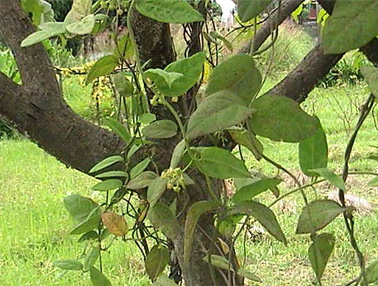|
Botanical Name:
Tylophora indica
Aantmool consists of dried leaf & / or bark of Tylophora
indica (Burm. F.) Merrill. (Synonym Tylophora asthmatica)
Family Asclepiadaceae.
Common Name(s) in English & Indian Languages
Sanskrit: Arkaparni, Lataksiri, Shwasaghni
Assamese: Antamul
Bengali: Antamul
English: Indian ipecacuahna
Guajarati: Damvel
Hindi: Antamul, Jangli pikvam
Kannada: Antamula, Nipaladaberu, Aadumuttada gida
Malayalam: Nansjera-patsja, Vallippala
Marathi: Khadari, Pitthakaadi, Pitthamaari, Pitvel
Oriya: Mendi, Mulini
Tamil: Naippalai, Nancaruppan
Telugu: Kakapala, Tellayadala, Verripala
Botanical description:
It is a small, slender, much branched, velvety, twining or
climbing herb with yellowish sap. Rootstock is 2.5-5 cm,
thick. Leaves, 6-11 cm long, 3.8-6 cm wide, are ovate-oblong
to elliptic-oblong, with a narrow tip, heart-shaped at base,
thick, velvety beneath when young, smooth above. Leaf stalks
are up to 1.2 cm long. Flowers are small, 1-1.5 cm across,
in 2 to 3-flowered fascicles in cymes in leaf axils. Sepal
up is divided nearly to the base, densely hairy outside.
Sepals are lance-shaped. Flowers are greenish- yellow or
greenish-purple, with oblong pointy petals. Fruit is a
follicle, up to 7x1 cm, ovoid-lance shaped.
Parts used:
Bark, Leaves
Major chemical constituents:
Tylophorine, kaempferol, α-amyrin and quercetin, other major
alkaloids like tylophorinine, tylophorinidine,
desmethylophorine, desmethylophorinine dehydrotylophorinine,
anhydrodehydro tylophorinine
Therapeutic uses:
• Anti-asthmatic
• Anti-inflammatory
• Immunomodulator
• Hepatoprotective |
|
.jpg)
 |
|
|



